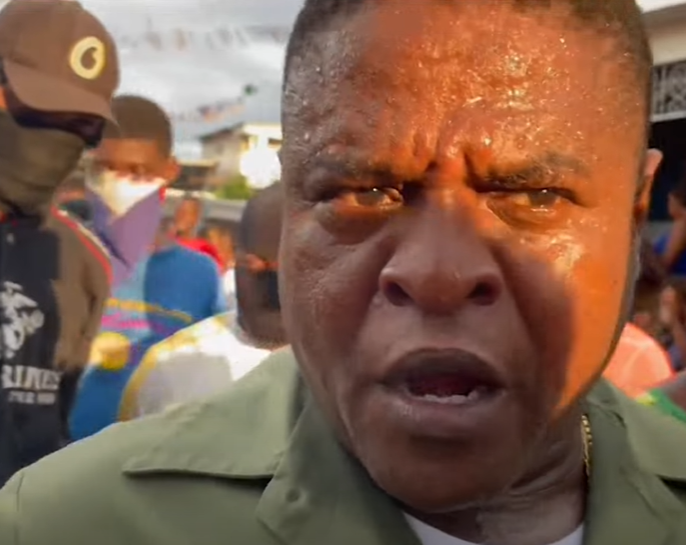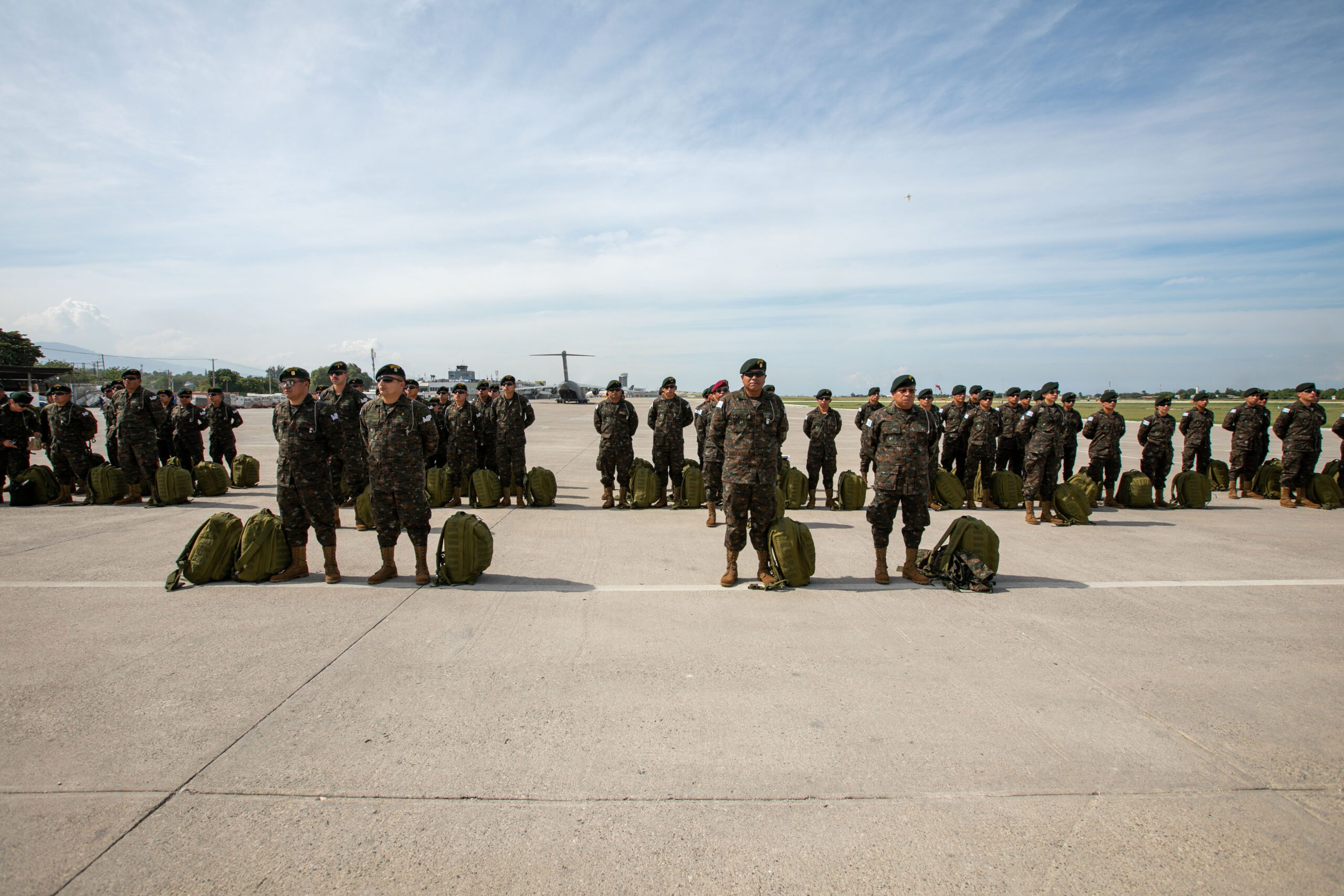Welcome to The Debrief, from the editors at Factal. Each month, we reflect upon an impactful yet underreported story that has significant regional or global implications. We’ll examine how the story has progressed and how Factal’s coverage has shifted to ensure we are always supplying our members with the most up-to-date, accurate, factual reporting.
If you like what you’re reading, sign up to receive The Debrief in your inbox on the first of every month here.
Haiti’s tipping point
aiti’s gangs are no longer a problem contained by the bounds of the capital Port-au-Prince and the spillover is pushing the fragile country into an even deeper abyss in the absence of sufficient international support.
Perched nearly 6,000 feet above sea level, the affluent Port-au-Prince suburb Kenscoff had largely been spared of the gang violence that has terrorized the capital over the last year. That changed in late January. The attack, which left at least 50 people dead, started unfurling over the weekend with no police response in sight as armed gang members arrived on horseback. Come Monday, those who could flee did, reluctantly leaving behind bodies of loved ones and skeletons of houses razed.
Weeks later, the attack on Haiti’s Kenscoff appears to mark an ostensible tipping point for Haiti, the Caribbean-shared-island-state where violence stemming from gangs, machete-wielding vigilantes and multi-national soldiers has been spilling over from certain suburbs of Port-au-Prince to areas previously considered safe over the past year.
“The new attacks in Kenscoff would portend that if the gangs can take control of these other areas outside of the capital, then they can control more of the supplies coming in and out of the capital,” Factal editor Jeff Landset said.
Recent gains by Haitian gangs suggest nearly 90 percent of the capital is now under their control and, with a presence in Kenscoff, they are nearly within reach of the wealthy Port-au-Prince suburb Pétion-Ville as well as the last free road running south.
“The main highway into Port-au-Prince is controlled by the gangs who extract a huge toll and it’s basically unusable … so we have these alternate roads going through the mountainous regions that are really treacherous,” Landset said.
Even prior to this new crisis point, half of Haiti’s population was exposed to the conflict. Life on the front lines has resulted in wide-spread acute hunger, massive displacement and dangerous levels of violence, including rape. The UN has described the situation as “dire” with Haiti watchers and journalists trying to sound the alarm as the armed march on Port-au-Prince saw more areas falling to gangs.
“Joining [the gangs] … might just be a necessity for people in that area who want to survive.”
The United-States-backed Multinational Security Support Mission in Haiti appears to have failed to halt the gang’s march on the capital and the spread of anarchy.
“It’s hard to imagine that things would be better if [the mission] wasn’t there but it … is kind of like putting a bandaid on a bullet hole,” Landset said. “It is basically the bare minimum that the international community could be doing.”
According to Landset, Haiti has had a fraught history with international aid. During the response to the 2010 earthquake, when international workers were blamed for a cholera outbreak that left thousands dead.
“Now the Kenyans have come in with this mission and there have been allegations of improper usage of weapons and violence,” Landset said. “I don’t think that many Haitians can say they’ve seen much of an impact.”
Port-a-Prince’s downward spiral was fast-tracked by a detente between the two main rival gangs in September 2023 which resulted in a grand alliance of sorts dubbed “Viv Ansanm,” Haitian Creole for “live together.”
The group claims to protect the very civilians who accuse members of rape, looting, and killings.
“The people being affected by this blame everybody,” Landset said. “They blame the gangs. They blame the government. They blame the international community for not doing enough and they are right to do so because the government hasn’t done enough. And the international community really hasn’t done enough.”
Yet, the ranks of these organized urban criminal units keep swelling, despite deep fear and resentment against them.
“Joining them … might just be a necessity for people in that area who want to survive,” Landset said. “To join the gang – be it for fear of violence or for hunger – there just isn’t a lot of choice for people.You see gang members living fairly well compared to the rest of the country – it is not much of a deterrence for young men trying to look for a way to survive.”
“Jimmy Barbecue sees himself as a potential strongman leader – he doesn’t necessarily want to get into politics in terms of elections and governance, but more so be the king of the country.”
Gang attacks on both local and international security forces persist north of the capital, as do attacks on locals such as those in the commune of Kenscoff in the south, ramping up pressure on Port-au-Prince.
“The gang attacks branching out into Kenscoff was really a huge paradigm shift,” Landset said. “It basically lends itself to the gang saying, ‘We want to take over the country.’”
The man leading the brutal Viv Ansanm armed alliance, former Haitian police officer Jimmy “Barbecue” Cherizier, has unveiled political ambitions after forcing the resignation of Prime Minister Ariel Henry last April. His alliance marked the Kenyan mission fair game, calling them “invaders” and “aggressors.”
Cherizier’s attempt to legitimize himself is not as brazen as it is reflective of a fractured state. The country has a transitional council plagued with turmoil and an appointed prime minister without much of a mandate. Several Haitian politicians highlighted the very real street power of the gangs in contrast to the government in a January letter to Caricom.
“Jimmy Barbecue sees himself as a potential strongman leader – he doesn’t necessarily want to get into politics in terms of elections and governance, but more so be the king of the country,” Landset said. “It is possible to see things in Haiti come to such a tenuous point that these gangs really do have a chance of taking over and becoming the main power inside the country.”
This combustion point is being accelerated by the simultaneous aid cuts and threat of repatriations with the latest U.S. foreign policy swing. President Donald Trump’s cuts, while still in litigation flux, could see Haiti lose up to $164 million in aid, and the impact has been immediate.
Landset told the story of a maternal and child health clinic in Cap-Haitien that was operating solely with U.S. aid money. Even though a judge reversed an order to cut aid, the clinic wasn’t able to reopen after the initial loss.
“It goes to show that you hear a lot about how the Trump administration is trying to fight crime and criminals and keeping people from immigrating into the U.S.” Landset said. “It might be one of the best gifts for these gangs to cut this aid to the Haitians that really need it.”
The Trump administration has also made clear the two pathways for Haitians to seek refuge in the United States opened up by the Biden administration are not stable. At least one has been revoked, setting up forced removals as early as April, and the other might remain in place until at least August, leaving Haitians in an even tougher conundrum — to return and fight for survival or find a way to flee to a third country.
Written by Halima Mansoor. Edited by Jillian Stampher.
Further reading:
- Review Factal’s coverage of gang violence in Haiti on our topic page (members link)
- Listen to the Factal podcast on deadly gang attacks in Haiti’s Kenscoff
- This piece by The New Yorker (paywall) explores the 19-year US invasion of Haiti
- Read this ACLED report on the alliance between Haiti’s main gang factions in Port-au-Prince

Thanks for reading! If you enjoyed this edition, sign up here to receive The Debrief in your inbox on the first of every month.
Top photo: Guatemalan and Salvadoran troops arrive in Haiti on Jan. 3, 2025, as part of the Multinational Security Support Mission meant to contain worsening security in the country. (Image / U.S. Embassy Haiti)
Factal gives companies the facts they need in real time to protect people, avoid disruptions and drive automation when the unexpected happens.
Try Factal for free or talk with our sales team (sales@factal.com) for a demo.

